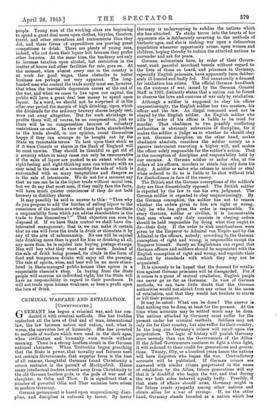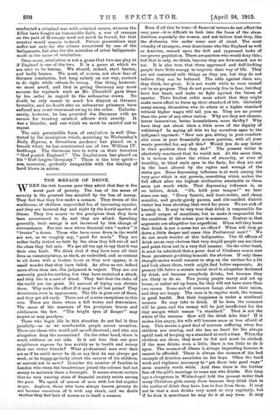CRIMINAL WARFARE AND RETALIATION. [CommuzircAzan.]
GERMANY has begun a criminal war, and has con- ducted it with criminal methods. She has trodden underfoot all the laws of God and of man, international law, the law between nation and nation, and, what is worse, the unwritten law of humanity. She has reverted to methods of warfare which were used in the dark ages, when civilization and humanity were words without meaning. There is a strong heathen streak in the German national character. When Treitschko began preaching that the State is power, that morality and fairness need not restrain Governments, that superior force is the beet of all reasons, thoughtful Germans found Christianity a severe restraint in the pursuit of Mnehtpoliiik. Hence many intellectual leaders turned away from Christianity to the old German heathen gods, to the gods of war and of slaughter, to Odin and Thor. It is significant that a number of powerful Odin and Thor societies have arisen in modern Germany.
German government is based upon unquestioning disci- pline, and discipline is enforced by terror. By terror Germany is endeavouring to subdue the nations which she has attacked. To strike terror into the hearts of her opponents she is deliberately reverting to the methods of barbaric ages, and she is making war upon a defenceless population whenever opportunity arises, upon women and children, hoping thereby to induce the attacked nations to surrender and ask for peace. German submarines have, by order of their Govern- ment, sunk peaceful merchant vessels without regard to the lives of those on board, and prisoners in Germany, especially English prisoners, have apparently been deliber- ately ill-treated and badly fed. Not unnaturally a demand for retaliation has arisen. The official German handbook on the customs of war, issued by the German General Staff in 1902, distinctly states that a nation can be forced to observe the laws and customs of war only by retaliation.
Although a soldier is supposed to obey his officer unquestioningly, the English soldier has two masters, his officer and the law. An illegal command need not be obeyed by the English soldier. An English soldier who kills by order of his officer is liable to be tried for murder. That obedience to two possibly conflicting authorities is obviously subversive of discipline, for it makes the soldier a judge as to whether he should obey or not. German discipline, on the other hand, makes obedience absolute, considers the soldier merely as a passive instrument executing a higher will, and makes the officer solely responsible for the soldier's action. That is the conception of discipline and responsibility held by our enemies. A German soldier or sailor who, at the orders of his officers, murders or steals has only done his duty. A soldier or sailor who refuses to murder or steal when ordered to do so is liable to be shot without trial for disobedience in face of the enemy.
The British and the German conceptions of the soldier's duty are thus diametrically opposed. The British soldier is expected by the law to use his own judgment. The German soldier is expected to obey unquestioningly. By the German conception, the soldier has not to reason whether the orders given to him are right or wrong.
Only be who has given the order is responsible. To every German, soldier or civilian, it is inconceivable that men whose only duty consists in obeying orders should be held responsible for doing what they ought to do—their duty. If the order to sink merchantmen wore given by the Emperor to Admiral von Tirpitz and by the Admiral to the officers, nobody, according to the German conception of right and wrong, is responsible except the Emperor himself. Surely no Englishman can expect that German officers and soldiers should be acquainted with the English conception of right and wrong, and regulate their conduct by standards with which they may not be acquainted. It is sincerely to be hoped that the demand for retalia- tion against German prisoners will be disregarded. For if it comes to a game of mutual retaliation, English people can never go as far as Germans. In view of German methods, we can have little doubt that the German authorities would not shrink from any crime in the name of retaliation, and that they would not hesitate to starve or kill their prisoners.
It may be asked : What can be done ? The answer is that nothing can be done, at least for the present. At the time when accounts may be settled much may be done. The nations attacked by Germany must suffer for the present under her criminal methods. Soldiers may not only die for their country, but also suffer for their country. In the long run Germany's crimes will recoil upon the perpetrators. The logic of history will punish Germany more severely than can the Governments of the Allies. If the Allied Governments continuo to fight a clean fight, it will redound to their credit for generations and genera- tions. Twenty, fifty, or a hundred years hence the nations will have forgotten who began the war. Contradictory accounts will be published. If German crimes are answered with similar crimes perpetrated in the name of retaliation by the Allies, future generations will say that it is doubtful who began the war, and that during the war both sides behaved equally badly. Possibly, if that state of affairs should arise, Germany might in the future create sympathy among other nations and obtain allies for a war of revenge. If, on the other hand, Germany stands branded as a nation which has
Conducted a criminal war with criminal means, whereas the Allies have fought an honourable fight, a war of revenge on the part. of Germany need not much be feared, for that country would remain isolated. Future generations may suffer not only for the crimes committed by one of the belligerents, but also for the mistakes of other belligerents made in the name of retaliation.
Once more, retaliation is not a game that two can play at if England is one of the two. It is a game at which we are sure to be beaten. We should, indeed, start beaten, and badly beaten. We must, of course, not show fear of German retaliation, but keep calmly on our way, content to do right while others do wrong. One thing, however. we must avoid, and that is giving Germany any more excuses for reprisals such as Mr. Churchill gave them by his order in regard to the submarine crews. No doubt he only meant to mark his disgust at German brutality, and no doubt also no submarine prisoners have suffered any cruel treatment owing to the order. Unfortu- nately, however, he has provided the Germans with an excuse for treating selected officers with cruelty. It was a blunder, and one which we must be careful not to repeat.
The only permissible form of retaliation is well illus- trated by the inscription which, according to Wednesday's Daily Express, a Streatham gardener has placed on a brooch which he has constructed out of two William IV. farthings. The Germans love to write on their brooches " God punish England." The Englishman has placed on his " God forgive Germany." There is the true spirit—. one, moreover, perfectly compatible with the dealing of bard blows in action.















































 Previous page
Previous page